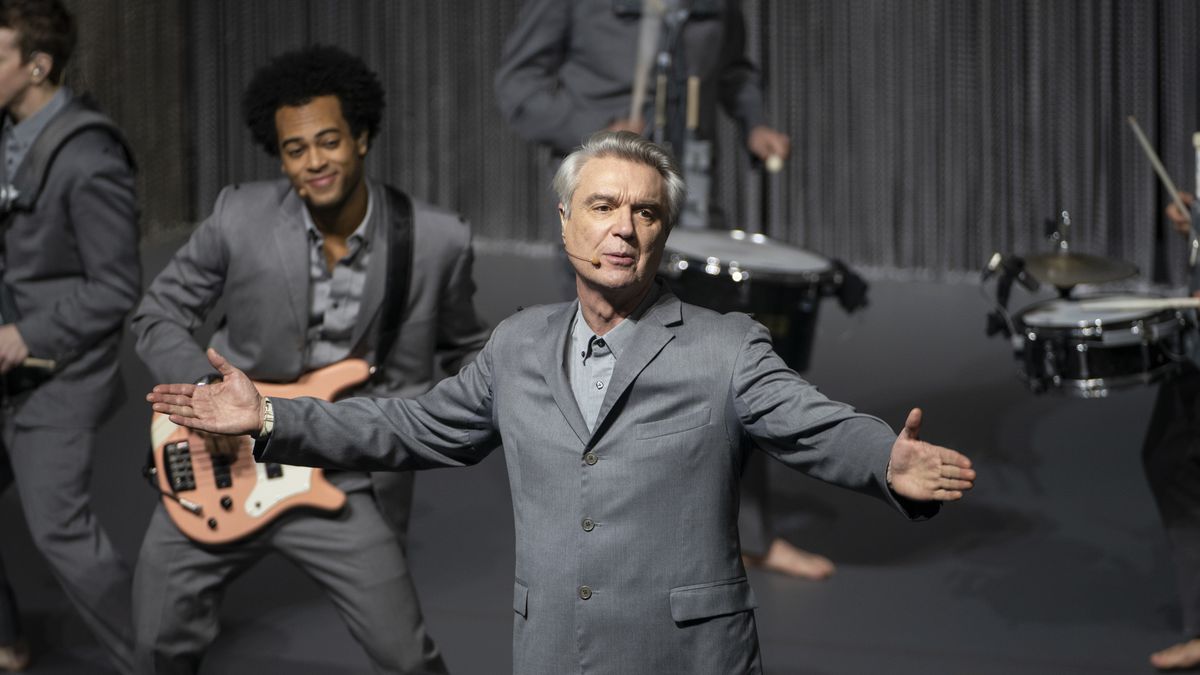American Utopia review: David Byrne’s concert film is for anyone who misses human connection
It would have been a miraculous celebration of neighbourly love even if it hadn’t been released in the middle of a pandemic

Dir: Spike Lee. Featuring: David Byrne, Chris Giarmo, Tendayi Kuumba, Karl Mansfield, Angie Swan, Bobby Wooten III, Mauro Refosco, Tim Keiper, Gustavo Di Dalva. 12, 105 mins
American Utopia, a filmed concert of David Byrne’s 2019 Broadway show, is for anyone who misses the simple pleasures of human connection. It would have been a miraculous celebration of neighbourly love even if it hadn’t been released in the middle of a pandemic. But, in these circumstances, that sense of temporary relief feels intoxicating. Captured by Spike Lee, the film gently creeps out of the shadows of Jonathan Demme’s Stop Making Sense – the 1984 concert film of Byrne’s old band, Talking Heads, and widely regarded as the best of its genre.
American Utopia is not only a worthy successor, but one that remains in conversation with what came before. We see how Byrne has grown has an artist, the edges of his cynicism now sawn off, replaced with a gentler craving to find joy in an uninhabitable world. Stop Making Sense opened with Byrne alone on stage – the same is true here. He gently prods at a plastic brain, contemplating how, as we grow older, our brains lose their neural connections. It becomes harder to empathise with others.
The rest of his band, consisting of 11 musicians, appear one by one. Their stage is empty, lined only with a few metallic curtains, giving it the feel of a holistic spa in some far-off future. Everyone, even Bryne, is barefoot and dressed in slate-grey suits. “I thought, what if we could eliminate everything from the stage, except the stuff we cared about the most?” the musician explains. “What would be left? Us... and you.” They navigate a setlist that includes Talking Heads classics (“This Must Be the Place”, “Road to Nowhere”), solo outings (“Bullet”, “I Know Sometimes a Man is Wrong”), and past collaborations ( “I Should Watch TV”, “Lazy”).
And, in doing so, they quietly build their own paradise, contained within one theatre, one night at a time. Byrne invokes the musical Hamilton when describing his bandmates, who hail from all parts of the globe – ”Most of us are immigrants, and we couldn’t do it without them”. And, unlike Stop Making Sense, these musicians have been liberated from the constraints of wires, amps, and stands. They all carry their instruments, percussionists and guitarists alike now free to move to any part of the stage, forming shapes together like synchronised swimmers.
Lee gives room for each band member to establish themselves as vibrant, individual personalities. Guitarist Angie Swan’s laidback manner exudes radical cool; Bobby Wooten III plays the bass with infectious glee; vocalists Chris Giarmo and Tendayi Kuumba beam in red lipstick and blue eyeshadow.
For a cover of Janelle Monáe’s 2015 protest song “Hell You Talmbout”, Byrne steps back to let his Black bandmates command the stage, as they repeat the names of Black Americans killed by racial violence. Lee cuts to portraits of the victims, sometimes held up by family members, and adds in a dedication to some of those killed this year: George Floyd, Breonna Taylor, and Ahmaud Arbery. A final, dense wall of names ends with the line: “AND TOO MANY MORE”. It's a haunting sight.
Byrne may offer an optimistic vision, but not a naive one, as he admits: “I also need to change”. American Utopia isn’t the solution; it’s proof that collective harmony isn’t a fool’s notion.

Join our commenting forum
Join thought-provoking conversations, follow other Independent readers and see their replies
0Comments